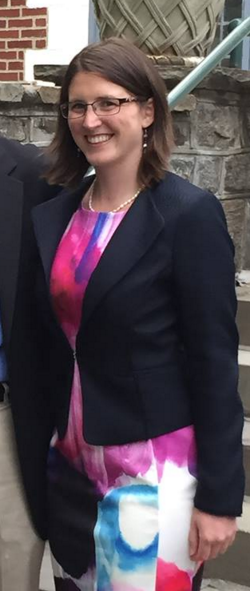What prompted you to pursue a graduate degree?
Prior to applying for genetic counseling programs, I spent four years as a lab technician and clinical coordinator in a Neurology lab at the University of Vermont and then at Brigham and Women’s Hospital. I really enjoyed my experiences working with the participants in our research studies and wanted to pursue a career where I’d be interacting with and helping people on a daily basis, instead of having it only be part of my job description. I am passionate about science, so genetic counseling is naturally a perfect fit for me, blending together my love of both science and people.
How did graduate school fit into your life at the time?
I did take those four years off before going back to school. It was a little difficult to get back into the school mindset. After four years of having my nights and weekends to have fun, it took me a while to readjust to focusing on academics most of the day every day. I was living in Somerville, MA when I was accepted to Sarah Lawrence, so I moved to Bronxville and stayed there throughout my two year program. It was convenient to be able to walk to campus. I don’t have a family of my own yet, but I have a lot of hobbies. I definitely didn’t have as much free time to spend climbing, skiing, and biking as I did before school, but it was worth that sacrifice.
Why did you choose Sarah Lawrence College for your graduate studies?
I applied to Sarah Lawrence because it is the most recognized genetic counseling program in the country. Sarah Lawrence started the first genetic counseling program and has trained most of the genetic counselors practicing in the United States. Additionally, the program’s psychosocial focus, connections with some of the best MDs in the country, variety of fieldwork opportunities across many different demographic populations, and a relatively large class size (compared to other programs) were all very appealing aspects of the program.
What experience as a Human Genetics student had the greatest impact on you?
My experience in New Zealand for my summer clinical rotation really had the greatest impact on me. I had the opportunity to work within a public healthcare system, experience a different culture and become familiar with new demographic populations of patients. I was able to network and form lasting relationships on the other side of the world. This experience allowed me to grow as an individual and as a genetic counselor.
How did your coursework prepare you for your clinical training/fieldwork, and how did that experience prepare you for your career?
Our program integrates course work with clinical rotations through both years of study. I liked this structure as it allowed me to constantly learn and attempt to apply that knowledge in a clinical setting the very same week. Additionally, the majority of our teachers were not faculty members at Sarah Lawrence, but actually were experts in their fields. It was an amazing opportunity to learn from the specialists within each area of study that our coursework was focusing on.
Where did you do your clinical training/fieldwork?
My clinical training was at the Children’s Hospital at Montefiore, Albert Einstein College of Medicine’s Children’s Evaluation and Rehabilitation Center, Maimonides Oncology Center, and New York Presbyterian.
What was life like as a graduate student at Sarah Lawrence?
I had a car while living in Bronxville, but I mainly used it to travel away from the area to go climbing or hiking, sometimes a longer road trip. Mostly, I took the train into New York City for rotations or to explore. My friends were all classmates of mine. They were my strongest support system while I was in school.
What is the strongest attribute of Sarah Lawrence College's genetic counseling program?
The strongest attribute is the class size, use of experts as adjunct faculty/professors, and diversity of populations served in the clinical rotations. Additionally, there is the opportunity to participate in the Leadership Education in Neurodevelopmental Disabilities (LEND) program. I was a LEND fellow at Einstein and had the opportunity to work all year with Dr. Robert Marion, serving the Bronx community. I received interdisciplinary training focused mainly on Autism Spectrum Disorder and had the opportunity to attend the AUCD conference in Washington, DC. I gained very specialized knowledge from this fellowship, and very few genetic counseling programs are associated with a LEND program.
What are you up to now?
Currently, I am a cancer genetic counselor at the Huntsman Cancer Institute (HCI) in Salt Lake City, Utah. I work with a team of five other genetic counselors serving 17% of the geographical U.S. with patients coming to us from five different states. I am in charge of the Lynch Syndrome screening program for all of HCI, making sure that all patients with colon, rectal, and endometrial cancer are being screened for this condition and referring patients that have positive screening results to our Family Cancer Assessment Clinic. Here at HCI, most of our counselors spend half our time on research projects, and the other half serving patients in clinic. We have three specialized clinics and also offer outreach, telemedicine, and group clinics. I am very excited about the work we’re doing here at HCI and am grateful for how my experience at Sarah Lawrence College prepared me to be a competitive job applicant and a resourceful and effective genetic counselor.
